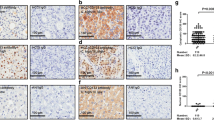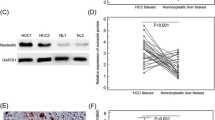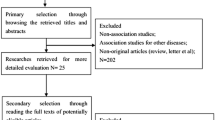Abstract
Proliferating cell nuclear antigen (PCNA) has been suggested as a potential diagnostic biomarker for early hepatocellular carcinoma (HCC). However, its prognostic significance in HCC remains unclear. In the present study, we investigated the expression and significance of PCNA in HCC and then analyzed the role of PCNA in clinical outcomes. Our findings show that the expression intensity of PCNA is much higher in HCC tissues than that in paracarcinoma tissues and associated with AFP, albumin, tumor number, clinical grade, vascular invasion, and tumor-node-metastasis (TNM) stage (all p < 0.000). Kaplan-Meier analysis indicated that high PCNA expression was associated with poor disease-free survival (DFS) (p < 0.000) and overall survival (OS) (p < 0.000) in a training cohort of 76 HCC patients. Multiple Cox regression analysis indicated PCNA acts as an independent predictor for DFS (p = 0.002) and OS (p = 0.004) in HCC patients. Along with pathological results, our systematic review also identified the expression of PCNA was closely associated with DFS and OS (both p < 0.000). In conclusion, this study suggested that PCNA is increased in HCC patients and is indeed a novel unfavorable biomarker for prognostic prediction for patients with this deadly disease.


Similar content being viewed by others
References
Allemani C, Weir HK, Carreira H, Harewood R, Spika D, Wang XS, et al. Global surveillance of cancer survival 1995-2009: analysis of individual data for 25,676,887 patients from 279 population-based registries in 67 countries (CONCORD-2). Lancet. 2015;385(9972):977–1010.
Torre LA, Bray F, Siegel RL, Ferlay J, Lortet-Tieulent J, Jemal A. Global cancer statistics, 2012. CA Cancer J Clin. 2015;65(2):87–108.
Li XP, Cao GW, Sun Q, Yang C, Yan B, Zhang MY, et al. Cancer incidence and patient survival rates among the residents in the Pudong New Area of Shanghai between 2002 and 2006. Chin J Cancer. 2013;32(9):512–9.
Altekruse SF, Henley SJ, Cucinelli JE, McGlynn KA. Changing hepatocellular carcinoma incidence and liver cancer mortality rates in the United States. Am J Gastroenterol. 2014;109(4):542–53.
Stoimenov I, Helleday T. PCNA on the crossroad of cancer. Biochem Soc Trans. 2009;37(Pt 3):605–13.
Wang SC, Nakajima Y, Yu YL, Xia W, Chen CT, Yang CC, et al. Tyrosine phosphorylation controls PCNA function through protein stability. Nat Cell Biol. 2006;8(12):1359–68.
Li Y, Dowbenko D, Lasky LA. AKT/PKB phosphorylation of p21Cip/WAF1 enhances protein stability of p21Cip/WAF1 and promotes cell survival. J Biol Chem. 2002;277(13):11352–61.
Naryzhny SN, Lee H. The post-translational modifications of proliferating cell nuclear antigen: acetylation, not phosphorylation, plays an important role in the regulation of its function. J Biol Chem. 2004;279(19):20194–9.
Hoelz DJ, Arnold RJ, Dobrolecki LE, Abdel-Aziz W, Loehrer AP, Novotny MV, et al. The discovery of labile methyl esters on proliferating cell nuclear antigen by MS/MS. Proteomics. 2006;6(17):4808–16.
Pan Y, Zhang Y, Chen L, Liu Y, Feng Y, Yan J. The critical role of Rab31 in cell proliferation and apoptosis in cancer progression. Mol Neurobiol. 2015. [Epub ahead of print] PMID: 26245486
Ng IO, Lai EC, Fan ST, Ng M, Chan AS, So MK. Prognostic significance of proliferating cell nuclear antigen expression in hepatocellular carcinoma. Cancer. 1994;73(9):2268–74.
Cao J, Hu X, Xie M, Sun J, Cheng H. Expression of proliferating cell nuclear antigen and alpha-fetoprotein in hepatocellular carcinoma and its clinical significance. Pract J Cancer. 1998;13(2):105–7.
Zhang Z, Wu Q, Hua Z, Zhou Z, Jia Z, Wang H. The expression of PCNA CD44v6 in human hepatic carcinoma and its clinical significance. Hainan Med J. 2000;11(6):8–11.
Claudio PP, Russo G, Kumar CA, Minimo C, Farina A, Tutton S, et al. pRb2/p130, vascular endothelial growth factor, p27(KIP1), and proliferating cell nuclear antigen expression in hepatocellular carcinoma: their clinical significance. Clin Cancer Res. 2004;10(10):3509–17.
Qin HX, Nan KJ, Yang G, Jing Z, Ruan ZP, Li CL, et al. Expression and clinical significance of TAp73alpha, p53, PCNA and apoptosis in hepatocellular carcinoma. World J Gastroenterol. 2005;11(18):2709–13.
Zhao Z, Zhan Y, Ni Y, Zhang M, Wang C. Prognosis and the expression of survivin protein and proliferating cell nuclear antigen (PCNA) in hepatocellular carcinoma. Shenzhen J Int Trad Chin West Med. 2007;17(6):355–7.
Hu TH, Wang CC, Huang CC, Chen CL, Hung CH, Chen CH, et al. Down-regulation of tumor suppressor gene PTEN, overexpression of p53, plus high proliferating cell nuclear antigen index predict poor patient outcome of hepatocellular carcinoma after resection. Oncol Rep. 2007;18(6):1417–26.
Gao F, Yang J, Liu B, Ma F, Geng Y, Li J. Expressions of PCNA and Hpa and their correlations with prognosis of patients with hepatocellular carcinoma. Hebei Med J. 2013;35(16):2410–2.
Qiu W, Wang G, Sun X, Ye J, Wei F, Shi X, et al. The involvement of cell surface nucleolin in the initiation of CCR6 signaling in human hepatocellular carcinoma. Med Oncol. 2015;32(3):75.
Li X, Liu X, Cui D, Wu X, Qian R. Clinical significance of nucleostemin and proliferating cell nuclear antigen protein expression in non-small cell lung cancer. J BUON. 2015;20(4):1088–93.
Poosarla C, Ramesh M, Ramesh K, Gudiseva S, Bala S, Sundar M. Proliferating cell nuclear antigen in premalignancy and oral squamous cell carcinoma. J Clin Diagn Res. 2015;9(6):ZC39–41.
Lan HA, Zain RB, Saitoh M, Muramatsu Y, Shrestha P, Mori M. Proliferating cell nuclear antigen and p53 in epithelial dysplasia and squamous cell carcinoma of oral mucosa—a marker for poor tumour differentiation, increasing nuclear atypia and invasiveness. Anticancer Res. 1996;16:3059–65.
Lv Q, Zhang J, Yi Y, Huang Y, Wang Y, Wang Y, et al. Proliferating cell nuclear antigen has an association with prognosis and risks factors of cancer patients: a systematic review. Mol Neurobiol. 2015. [Epub ahead of print] PMID: 26558632
Li J, Li H, Liu J, Feng B, Feng M, Lv B, et al. The clinical implications of human telomerase reverse transcriptase expression in grade and prognosis of gliomas: a systematic review and meta-analysis. Mol Neurobiol. 2015. [Epub ahead of print].
Bowman GD, Goedken ER, Kazmirski SL, O’Donnell M, Kuriyan J. DNA polymerase clamp loaders and DNA recognition. FEBS Lett. 2005;579:863–7.
Acknowledgments
We greatly thank other members of our lab for valuable suggestions and writing.
Author information
Authors and Affiliations
Corresponding author
Ethics declarations
This study was approved by the Ethics Committee of Shandong Cancer Hospital and Institute and complied with the Declaration of Helsinki. All of the patients provided written informed consent.
Rights and permissions
About this article
Cite this article
Ma, S., Yang, J., Li, J. et al. The clinical utility of the proliferating cell nuclear antigen expression in patients with hepatocellular carcinoma. Tumor Biol. 37, 7405–7412 (2016). https://doi.org/10.1007/s13277-015-4582-9
Received:
Accepted:
Published:
Issue Date:
DOI: https://doi.org/10.1007/s13277-015-4582-9




